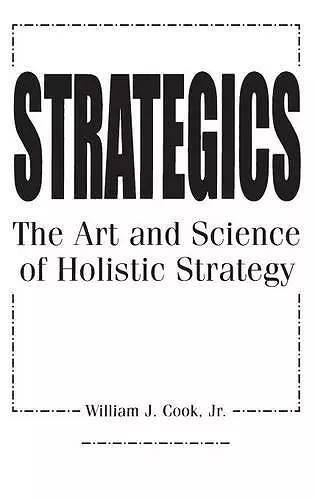Strategics
The Art and Science of Holistic Strategy
Format:Hardback
Publisher:Bloomsbury Publishing PLC
Currently unavailable, and unfortunately no date known when it will be back

An examination of the three critical elements of strategy-thinking, planning, and action-and a blue print for using this new approach in public and private sector management and for studying it in university classrooms.
Most of what passes for strategic planning is not strategic at all. Cook maintains that even to attempt strategy there must first be a strategic system, a system that deals with strategic issues, decision-making, and strategic action, which is preceded by strategic thinking.
Most of what passes for strategic planning is not strategic at all. It is long-range planning or comprehensive planning, or in some cases just program or project planning. The result is a relinquishment of control to external conditions and circumstances, the perpetuation of obsolete systems, and organizational fragmentation and internal conflict. The opportunity to create new possibilities and realities—the ultimate object of strategy—is lost. Cook maintains that even to attempt strategy there must first be a strategic system, a system that deals with strategic issues, decision-making, and strategic action, which is preceded by strategic thinking. Cook combines these three aspects of strategy into a coherent, powerful concept that reinvigorates strategy with its original forceful meaning: strategos—to lead an army. In this way strategy becomes the means by which communities continuously create artifactual systems to serve extraordinary purposes. His book contains sound, pragmatic theory, original insights into strategic issues, and detailed hands-on guidance on all phases of strategic thinking, planning, and action. Cook explains that stragetics can be expressed as thinking, planning, and action. Strategic thinking will always embrace five arenas: the definition of strategy, the meaning of leaders and leading, the distinction between condition and cause, the nature of systems, and the characteristics of organizations. Strategic planning, as a currently popular management practice, is not what it was originally. The definition has changed. The only definition that captures the original intent is: the means by which a community of people create artifactual systems to serve extraordinary purposes. Dr. Cook points out that strategic action is seldom included in any contemporary intepretation or application of strategy, yet action is both the realization of strategy and the creation of new possibilities beyond strategy. In that sense, strategic action is the end and the beinning of strategics. Thus, Cook takes the traditional idea of strategic planning, infuses it with strategic thinking, and carries it to strategic action. Instead of merely improving what already exists, organizations can create new systems that are capable of what he calls constant emergence—always vital, always creatISBN: 9781567202786
Dimensions: unknown
Weight: 680g
320 pages